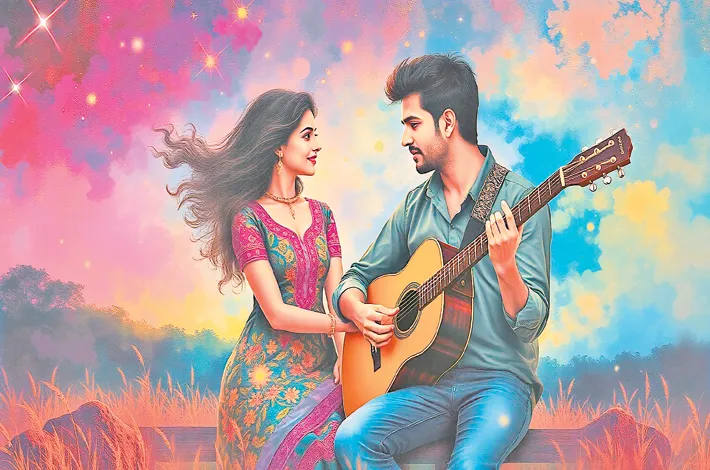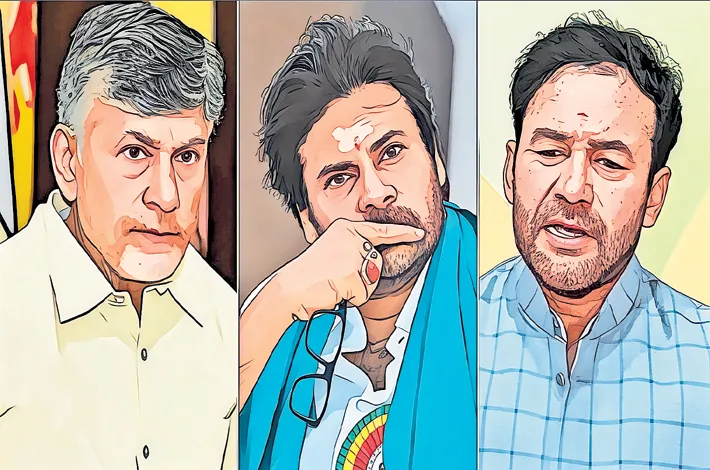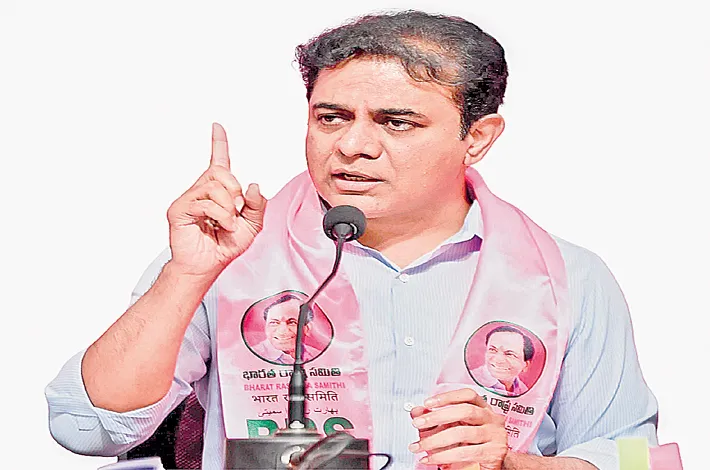Coming back to reality
24-07-2025 12:00:00 AM

The monsoon rains painted Mumbai in shades of gray, the city’s chaos softened by the rhythmic patter of droplets on tin roofs. Anjali stood by the window of her small Andheri flat, her fingers tracing the cold glass as memories flooded her mind. The scent of wet earth reminded her of him—Rohan, the man she’d loved fiercely, the man she’d let slip away.
Five years ago, Anjali was a budding artist, her canvases bursting with colors that mirrored her free spirit. Rohan was a struggling musician, his guitar strumming melodies that spoke of dreams too big for their small-town lives in Bhopal. They met at a college fest, where her vibrant paintings adorned the walls, and his soulful rendition of an old Kishore Kumar song held the crowd spellbound. Their love bloomed like marigolds in spring—bright, unapologetic, and fleeting.
But love, Anjali learned, was no match for the weight of tradition. Her family, bound by the rigid expectations of their middle-class upbringing, saw Rohan as a risk—a dreamer with no steady income, no status to match their aspirations for her. “He’s not one of us,” her father had said, his voice heavy with finality. Anjali, torn between love and duty, chose silence. She married Vikram, a software engineer her parents approved of, and moved to Mumbai, leaving Rohan and their shared dreams behind.
Vikram was kind, dependable, everything a husband should be. Yet, Anjali’s heart remained a locked diary, its pages filled with Rohan’s laughter, his gentle touch, and the way his eyes lit up when he spoke of music. Her paintings grew somber, the colors muted, as if her soul refused to create without him.
One humid evening, as the city buzzed with its usual frenzy, Anjali’s world tilted. She was at an art gallery in Colaba, her first solo exhibition in years, a quiet rebellion against the monotony of her life. The crowd murmured appreciatively, but her eyes caught a figure in the corner—a man with tousled hair, a guitar slung over his shoulder. Her breath hitched. It was Rohan.
He looked different, yet achingly familiar. The boyish charm had given way to a rugged edge, his eyes carrying the weight of unspoken stories. He approached her, his smile hesitant. “Anjali,” he said, his voice a melody she hadn’t heard in years. “You’re still painting.”
Her heart raced, but she steadied herself. “And you’re still carrying that guitar.”
They talked, the years melting away with every word. Rohan had moved to Mumbai too, chasing his music. He’d found some success, performing at small gigs, but the industry was brutal, and stability remained a distant dream. Anjali spoke of her life, her marriage, her art—careful to keep her words light, though her eyes betrayed her longing.
Over the next few weeks, they met in secret, stealing moments in crowded cafés and quiet corners of Marine Drive. It was as if time had rewound, their laughter echoing the past. But each meeting was laced with guilt. Anjali loved Vikram, in her own way, but with Rohan, she felt alive—her colors returned, her canvases vibrant once more.
One rainy evening, under the shelter of a crumbling bus stop, Rohan took her hand. “Anjali, I never stopped loving you,” he said, his voice raw. “But I can’t ask you to leave everything for me. Not again.”
Tears mixed with the rain on her cheeks. She wanted to run to him, to rewrite their story, but the weight of her marriage, her family’s expectations, and society’s judgment held her back. “I can’t hurt Vikram,” she whispered. “He’s a good man.”
Rohan nodded, his eyes glistening. “Then let’s meet one last time, Anjali. Ek baar phir, like it used to be.”
They planned a day together, a final farewell to the love they couldn’t keep. They wandered through Chor Bazaar, laughing over quirky antiques, shared a plate of vada pav by the sea, and danced in the rain to a street musician’s tune. For those hours, they were young again, untethered by the world’s rules.
As dusk fell, they stood at the edge of Bandstand, the waves crashing below. Rohan pulled out his guitar and played a song he’d written for her—a haunting melody of love and loss. Anjali’s heart broke, but she knew this was goodbye. “You’ll always be my muse,” she said, her voice trembling.
“And you, mine,” he replied, kissing her forehead softly.
Anjali returned home that night, her heart heavy but resolute. She told Vikram everything—not out of guilt, but because she wanted to be honest. To her surprise, Vikram listened quietly, his eyes kind. “I’ve seen you fade, Anjali,” he said. “If he’s what makes you whole, I won’t hold you back.”
But Anjali shook her head. “I chose you once, Vikram. I’ll choose you again. But I need to paint, to live, to be me.”
Vikram smiled, a bittersweet acceptance. “Then let’s find a way to make that happen—together.”
Months later, Anjali’s art flourished, her canvases a blend of love, loss, and hope. Rohan’s music reached new heights, his songs echoing their story. They never met again, but their love lived on—in her colors, in his chords, a testament to a love that dared to exist, ek baar phir.








